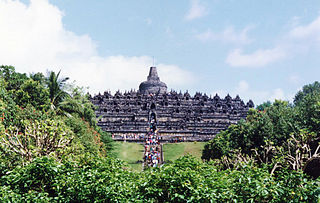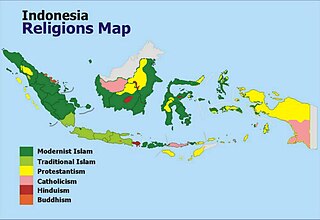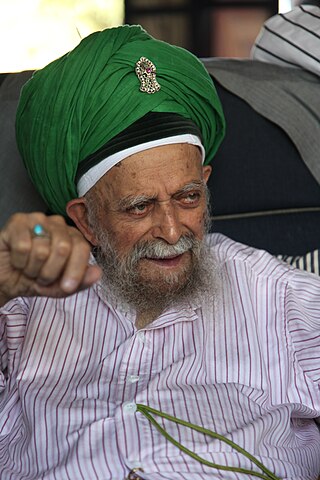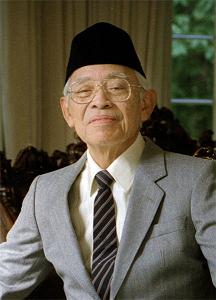Subud is an international, interfaith spiritual movement that began in Indonesia in the 1920s, founded by Muhammad Subuh Sumohadiwidjojo (1901–1987). The basis of Subud is a spiritual exercise called the latihan kejiwaan, which Muhammad Subuh said represents guidance from "the Power of God" or "the Great Life Force."

James Roger McGuinn is an American musician, best known for being the frontman and leader of the Byrds. He was inducted into the Rock and Roll Hall of Fame for his work with the Byrds. As a solo artist he has released 10 albums and collaborated with, among others, Bob Dylan, Tom Petty and Chris Hillman. The 12-string Rickenbacker guitar is his signature instrument.
John Godolphin Bennett was a British academic and author.
Old Javanese or Kawi is the oldest attested phase of the Javanese language. It was spoken in the eastern part of what is now Central Java and the whole of East Java, Indonesia. As a literary language, Kawi was used across Java and on the islands of Madura, Bali, and Lombok. It had a sizable vocabulary of Sanskrit loanwords but had not yet developed the formal krama language register, to be used with one's social superiors that is characteristic of modern Javanese.

The Israʾ and Miʿraj are the two parts of a Night Journey that Muslims believe the Islamic prophet Muhammad took during a single night around the year AD 621. Within Islam, the majority of scholars agree that the journey was both a physical and spiritual one in spite of the physics required for such a journey making it essentially impossible. A brief mention of the story is found in the 17th surah (chapter) of the Quran, called al-Isra', while details of the story are found in the hadith.
The Muhammad Subuh Foundation (MSF) is a charitable foundation named in honor of Muhammad Subuh Sumohadiwidjojo, the founder of Subud. It is a non-profit, tax-exempt body constituted in the Commonwealth of Virginia. Its major functions are to finance the purchase and construction of Subud centers, and to preserve and disseminate the writings and talks of Bapak, including his definitive book, published in 1952, Susila Budhi Dharma.
Latihan is a form of spiritual practice. It is the principal practice of the Subud organization.

Kejawèn or Javanism, also called Kebatinan, Agama Jawa, and Kepercayaan, is a Javanese cultural tradition, consisting of an amalgam of Animistic, Buddhist, Islamic and Hindu aspects. It is rooted in Javanese history and religiosity, syncretizing aspects of different religions and traditions.

Nūr is a term in Islamic context referring to the "cold light of the night" or "heatless light" i.e. the light of the moon. This light is used as a symbol for "God's guidance" and "knowledge", a symbol of mercy in contrast to Nar, which refers to the diurnal solar "hot light" i.e. fire. In the Quran, God is stated to be "the light (Nūr) of the heavens and the earth". Many classical commentators on the Quran compare this to God illuminating the world with understanding, not taken literally. The first and foremost to representatively stand to the concept of nūr muḥammadī being the quintessence of everything was Sayyid Abdul Qadir Gilani, who described this idea in his book Sirr ul Asrar. This concept was then preached by his disciples. One of Sayyid Abdul Qadir Gilani's disciples was the Andalusian scholar Abu Bakr ibn al-Arabi, who categorized nūr into different levels of understanding from the most profound to the most mundane. Shias believe nūr, in the sense of inner esoteric understanding, is inherited through the Imams, who in turn communicate it to the people.

Susila Budhi Dharma is a book written by Muhammad Subuh Sumohadiwidjojo, the founder of the World Subud Association, in the city of Jogjakarta, Indonesia, in 1952. Its name corresponds to the three main qualities that are to be developed through the training in the Subud path. The name "Subud" is a contraction of these three Javanese words of Sanskrit derivation.
Gil Fronsdal is a Norwegian-born, American Buddhist teacher, writer and scholar based in Redwood City, California. He has been practicing Buddhism of the Sōtō Zen and Vipassanā sects since 1975, and is currently teaching the practice of Buddhism in the San Francisco Bay Area. Having been taught by the Vipassanā practitioner Jack Kornfield, Fronsdal is part of the Vipassanā teachers' collective at Spirit Rock Meditation Center. He was ordained as a Sōtō Zen priest at the San Francisco Zen Center in 1982, and was a Theravāda monk in Burma in 1985. In 1995, he received Dharma transmission from Mel Weitsman, the abbot of the Berkeley Zen Center.

Several different religions are practised in Indonesia. Indonesia is officially a presidential republic and a unitary state without an established state religion. Indonesia has the world's largest Muslim population and the first principle of Indonesia's philosophical foundation, Pancasila, requires its citizens to state the belief in "the one and almighty God". Although, as explained by the Constitutional Court, this first sila of Pancasila is an explicit recognition of divine substances and meant as a principle on how to live together in a religiously diverse society. However, blasphemy is a punishable offence and the Indonesian government has a discriminatory attitude towards its numerous tribal religions, atheist and agnostic citizens. In addition, the Aceh province officially applies Sharia law and is notorious for its discriminatory practices towards religious and sexual minorities. There are also Islamic fundamentalist movements in several parts of the country with overwhelming Muslim majorities.

Dominic Christopher Henry Rieu was a classical scholar and the son of the classicist and publisher E. V. Rieu.

Ignatius Cardinal Suharyo Hardjoatmodjo is an Indonesian prelate of the Catholic Church. He has been Archbishop of Jakarta since 2010, after serving as Archbishop of Semarang from 1997 to 2009. He is commonly known as Archbishop Suharyo.
John Starr Cooke was an American mystic and spiritual teacher who influenced the development of the counterculture movement that emerged in San Francisco during 1966–1967. His teachings were based on the doctrine of “One Consciousness”, which Cooke believed was communicated to him through a Ouija board in the early 1960s. He designed three original decks of Tarot cards: T: The New Tarot for the Aquarian Age, the Atlantean Tarot (1992), and the Medieval Tarot (1992).

The following is an alphabetical list of topics related to the Republic of Indonesia.

Shaykh Muhammad Nazim Adil Al-Qubrusi Al-Haqqani, commonly known as Shaykh Nazim, was a Turkish Cypriot Sunni Muslim imam and one of the most influential members of the Haqqani stream of the Naqshbandi order (tariqa) of Sunni Islam.

Albertus Soegijapranata, SJ, better known by his birth name Soegija, was a Jesuit priest who became the Apostolic Vicar of Semarang and later its archbishop. He was the first native Indonesian bishop and known for his pro-nationalistic stance, often expressed as "100% Catholic 100% Indonesian".

Muhammad Ainun Nadjib, best known as Emha Ainun Nadjib or Cak Nun/Mbah Nun, is an Indonesian poet, essayist, kyai, ulama, and humanist. Born in Jombang, East Java, Nadjib began writing poetry while living in Yogyakarta, publishing his first collection in 1976. He became one of the city's predominant poets by the late 1980s, and by then had also began writing essays. He is the leader of the Kiai Kanjeng group, which stages dramas and musical performances on religious themes.
Joyce Yvonne Collin-Smith, was an English author, journalist, and spiritualist.












